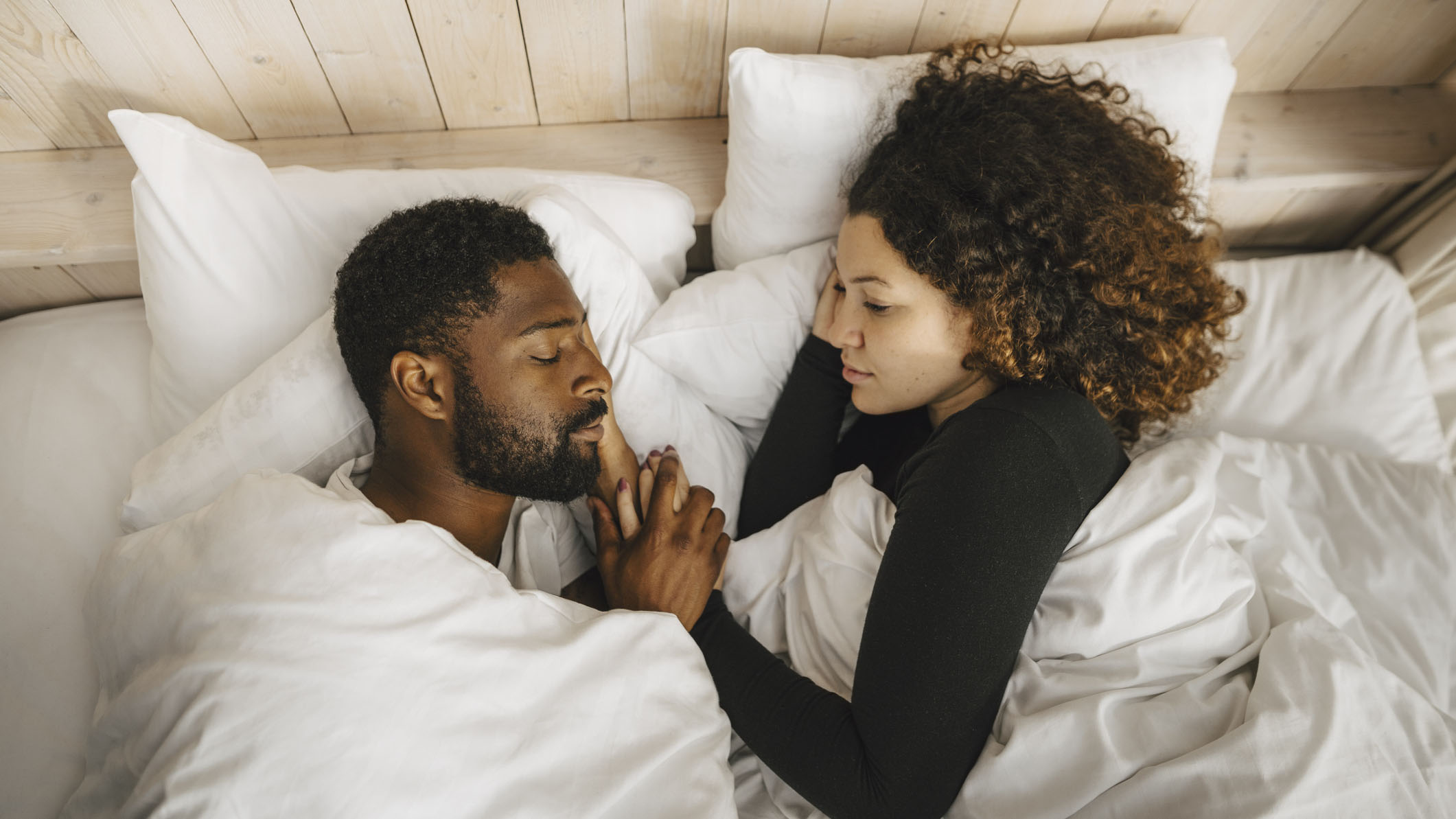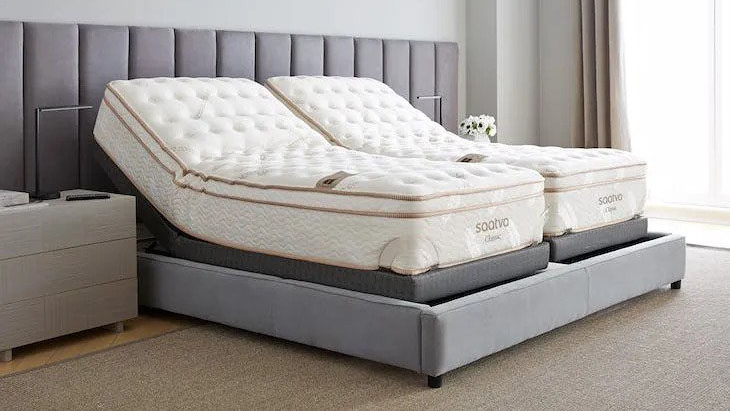
Do you look forward to nights your partner isn’t home? Don’t worry, you’re not a loveless spouse; in fact you’re quite normal. Four in five Americans admit their partner’s sleeping habits consistently wake them up and over a third say they look forward to nights alone, according to new research.
A survey of Americans who live with a partner found 36% of respondents appreciate when they don’t have to share a bed. Picture it: You’re starfishing across the bed, there’s no scuffles over when to turn the lights out and no duvet war – what could be more peaceful? But there are solutions, like choosing the best mattress for both of your sleep needs.
There is still hope for love as the majority of respondents said they aren’t quite irate enough to consider a ‘sleep divorce’. After analysing the most common sleep-disruptors, we’ve rounded up top tips for sleeping peacefully next to your partner. Believe it or not, with a little compromise, it is possible.
How sleeping with a partner can negatively impact your sleep quality
There are many obvious ways sleeping with a partner can negatively impact your sleep as personal space becomes non-existent. Having another human tossing and turning right next to you isn't exactly peaceful.
The survey conducted by OnePoll on behalf of Avocado Green Mattress asked 2,000 Americans what they found to be the most common sleep-disruptive habits their partner does. Answers ranged from (surprise, surprise) snoring to scrolling on their phone in bed and getting up to use the bathroom.
5 ways to sleep peacefully next to your partner
While you may feel like giving up as the sleep deprivation mounts, here's some of our top tips that ease sharing a bed.
1. Try the Scandinavian Sleep Method
A requisite for a peaceful marriage before sleep divorce hits, the Scandinavian Sleep Method is growing in popularity among couples with different sleep needs.
This method involves a couple sleeping in the same bed, but each using a separate duvet or blanket. It's a logical, effective way of salvaging your co-sleeping arrangement when you or your partner are a duvet hogger.
It’s also useful if one of you easily feels the cold during the night as you can layer up your side of the bed as much as you desire without compromise. Scandi sleeping is a simple, low-cost trick for couples to get a better night's sleep.

2. Choose a mattress with good motion isolation
Motion isolation is all about the mattress’ ability to prevent movement on a particular part of a bed being transferred to other parts of the bed. For example, if you were lying on the right side of the bed and someone came along and sat down on the left side, good motion isolation would mean you wouldn't feel them doing so.
Hence, the best mattresses to save you from a sleep divorce will need exquisite motion isolating powers. We recommend our top-rated Saatva Classic, the DreamCloud Luxury Hybrid or the WinkBed Luxury Hybrid Mattress. A mattress with strong motion isolation is especially important for couples with different routines and schedules.
3. Choose a split king or adjustable firmness
Another great bed option for disagreeing couples who still want to bed share is investing in a split king mattress or a mattress with adjustable firmness.
Like the best king mattresses, a split king bed is a mattress that measures 76 inches wide by 80 inches long. The only difference between a standard king and a split king is that a split king mattress comprises two separate twin XL mattresses to form one big king-size bed.
Signs you need a split king mattress include only one of you finding the bed comfy or one partner sleeping hotter than the other. We recommend the Saatva Classic Hybrid Split King Mattress, Brooklyn Bedding’s Signature Hybrid Split Cal King Mattress or the DreamCloud Hybrid Mattress Split King Mattress.

Alternatively, if you sleep in different positions or have largely different body weights, an mattress with adjustable firmness can ensure you both get the comfort and support you need through the night.
These beds allow you to change the firmness level of your mattress at the push of a button. Each side of the bed can be adjusted independently to suit different preferences.
4. Invest in good earplugs or other devices
Investing in a good pair of earplugs will help you block out noise from your partner, be it snoring or scrolling. Our team member recently tested the Loop Quiet 2 Earplugs and found they were effective at muffling enough sound for them to sleep deeply, wake up less and fall asleep faster, all while staying in their ears all night without irritation.
If earplugs aren’t your thing you could try drowning out your partner’s disruptions with white noise or trying an anti-snoring device if that is your main nighttime affliction.
5. Communicate and create routine
If you’re looking for cheaper ways to solve your nighttime disagreements, the first port of call should be an honest conversation with your partner about what you need to sleep well. They might not even be aware of the impact they are having on your sleep, after all.
Addressing your sleep issues and needs together can create a sustainable routine that honours the important of sleep quality. Sleep impacts our emotions and both partners getting restorative sleep is essential to maintaining a happy, healthy relationship.

6 most common sleep habits that wake partners up
According to the survey, these are the most commonly reported sleep habits that wake partners up when bed sharing.
1. Snoring
Snoring has long wreaked havoc on marriages around the world. It’s not surprising that it is taking the top spot for the most common sleep-disruptive habit with 52% of people saying their partner’s ZZZs keep them up at night. Other research shows 37 million Americans snore regularly and snoring is reportedly one of the top reasons for couples opting for a sleep divorce.
While snoring is often harmless, albeit pretty annoying, it can sometimes be a sign of more serious sleep disorders such as sleep apnea. So if it is seriously affecting your or your partner’s sleep it is worth seeking medical advice.
2. Scrolling
Is there anything more annoying than someone laying next to you with random video sounds or the tip tap of a keyboard emanating from their phone, while they intermittently chuckle to themselves? I think not. And 33% of the survey respondents agree, saying their partner scrolling through their phone before bed disrupts their sleep.
We’re familiar with the impact using devices in bed has on sleep quality, and while you might have your scrolling habits under control, your partner might not. It’s important for you to agree on a switch off time for the best quality, bicker-free rest.

3. Using the bathroom at night
Understandably, they can’t help this one. But a third of people said their partner getting up and out of bed to use the bathroom during the night often affected their sleep.
Partner’s of those suffering with nocturia—the need to get up regularly during the night to urinate—will especially relate to this one. Research shows this disorder affects 50 million people in the US, hence why it is so common for nighttime bathroom trips to be disrupting couples’ sleep.
4. Hogging the covers
One of the most common marriage wars is no doubt the tug of war over the bed covers. There's nothing worse than waking up in the middle of the night shivering while your partner is comfortably cocooned in the duvet.
27% of participants in Avocado Green Mattress survey reported their partner hogging the covers as a key sleep disruptor. Separate duvets don’t seem so bad after all, thanks Scandi Sleep Method.

5. Tossing and turning
Sharing a bed with a restless sleeper can be a real life nightmare. A quarter of survey respondents said their partner tossing and turning disrupts their sleep.
No matter how still you sleep, their movements are sure to keep you up. Being repeatedly elbowed in the back or whacked by a restless leg is hardly conducive to a restful night.
5. Starfishing
Ever been left hanging on a sliver at the edge of your mattress (thank goodness for edge support), fighting for space as your partner spreads their limbs across the rest of the bed?
You’re not alone. The new research shows 21% of people are in the same boat as they report struggling to sleep because of their partner’s ‘starfishing’ habits.

Is a sleep divorce a good idea?
A sleep divorce is when a couple chooses to sleep in separate rooms or beds instead of sharing their sleep space. There is a lot of controversy around whether a sleep divorce is a good idea.
Some people say it can save relationships as sleep disturbances, like those faced by 82% of Americans, can reduce sleep quality and cause couples to argue. When people are well-rested, they have more patience and energy, which can improve interactions with their partner. A-list celebrities like Cameron Diaz and Gwyneth Paltrow advocate for sleep divorces, crediting them for improving their relationships.
But no matter what the celebs say, not everyone thinks a sleep divorce is a good idea. Many people fear it jeopardises intimacy in relationships and causes feelings of emotional disconnection.
The general consensus is that it should be the last resort after you’ve tried other methods, like those above, to improve your bed sharing situation.






